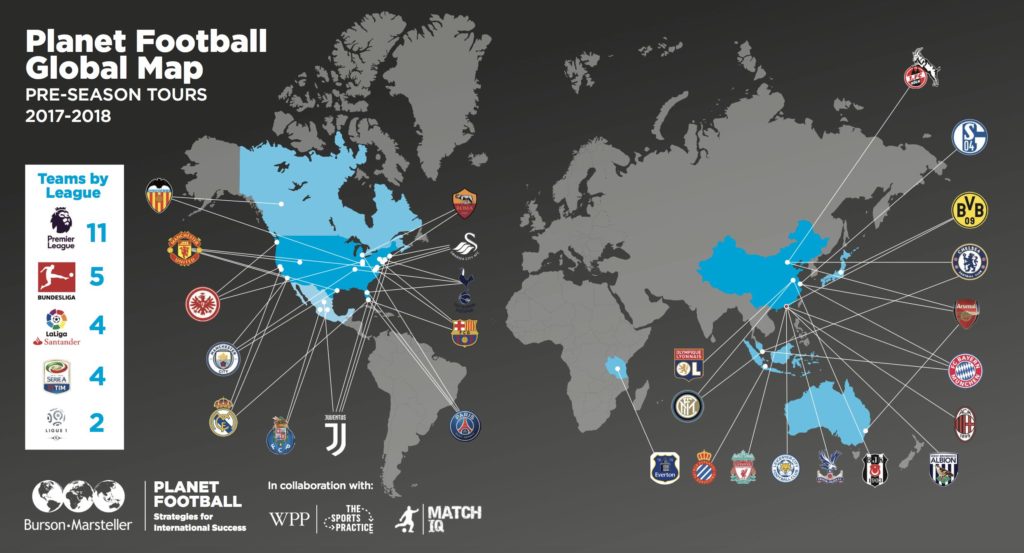July 21 – Football has always been global but the concept that its biggest club brands are also global opportunities is never more obvious than in the pre-season tours that see the giant of the European club game play ad-hoc tournaments, friendlies and exhibition game across the globe.
A new report, titled the Planet Football report, from WPP agencies Burson-Marsteller, WPP Sports Practice and Match IQ looks at the brand globalisation of the game and “how to grow in an increasingly competitive and globalized market place while, at the same time, staying true to their roots and core values.”
It is a big question but a key conclusion of the report is that the Premier League’s European rivals are missing opportunities to win new international fans.
More than half of the Premier League’s 20 teams will play overseas games during the close season, compared with only five teams from the German Bundesliga, four from the Italian Serie A and La Liga Santander (Spain) and even fewer from Ligue 1 (France). The most popular overseas destinations for European clubs are North America and China.
The report emphasises international fan engagement for clubs to win over tte next generation of fans. The centenntials are “digital, mobile and social natives”, says the report. They are also expected to represent 40% of consumer purchasing power by 2020.
“Significant international expansion requires new forms of engagement, new products, new markets, and often new employees or partners,” says William Gaillard, former Director of Communications for UEFA and senior sport adviser at Burson-Marsteller.
“Finding the right balance between the traditional and the new is no easy task for any organisation – and certainly not for sport stakeholders rooted in their local communities. A tension will always be there when it comes to determining why, when, where and how international expansion should best take place to ensure success in the decades ahead.”
The report provides a summary of “12 strategic imperatives”
- Understand that your audience is changing
- Bestrategic, play the long game
- Define your overarching purpose
- Embrace the new broadcasting realities
- Identify your growth markets
- Never forget your (local) identity
- Manage commercial and sporting expectations
- Develop your own programme
- Plan your international tours
- Athletes will drive your engagement
- Build outside the box partnerships
- There is no status quo in sport
Finding the right balance is key, but doing nothing and piggy backing on organic growth is clearly not going to achieve the potential for clubs and leagues.
“It is clear from our report that every top-tier football club, indeed every sports organisation, needs to seek change if it is ambitious,” says Gaillard. “The process of international expansion is an unstoppable force and the status quo is not an option. Embracing the new realities and engaging with the new opportunities is a strategic imperative for all decision-makers in the industry.”
The full report can be downloaded here.
Contact the writer of this story at moc.l1713514233labto1713514233ofdlr1713514233owedi1713514233sni@n1713514233osloh1713514233cin.l1713514233uap1713514233


